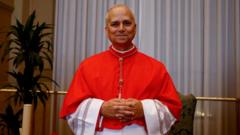The newfound papacy draws attention to the shifting dynamics of Catholic leadership and its implications on global unity, faith, and social justice.
**Historic Election: Robert Francis Prevost Becomes First American Pope as Leo XIV**

**Historic Election: Robert Francis Prevost Becomes First American Pope as Leo XIV**
Pope Leo XIV's election marks a significant moment in Catholic history, bridging national and global faith perspectives.
On May 8, 2025, Robert Francis Prevost was elected as the 267th Pope of the Roman Catholic Church, taking the name Pope Leo XIV. His election is historically significant as he becomes the first pope from the United States, a move that defied traditional expectations about the papacy's geographic representation. Cardinal Prevost addressed the throngs assembled in St. Peter’s Square, delivering a message centered on peace and unity, echoing the sentiments of his predecessor, Pope Francis.
Born in Chicago, Prevost dedicated two decades of his life to pastoral service in Peru, becoming a bishop there and later a cardinal under Francis in 2023. His appointment as pope comes at a pivotal time, following the death of Pope Francis, and the church faces ongoing ideological debates surrounding inclusivity, doctrinal adherence, and the mission of the Catholic Church in a rapidly changing world.
During the conclave that lasted just over 24 hours, 133 cardinals, some appointed by Francis, gathered in a bid to resolve the divided perspectives regarding the future leadership of the Catholic Church. Leo XIV emerged as a candidate seen as a centrist, capable of balancing the progressive and conservative factions within the church.
His inaugural speech was laden with calls for reconciliation, reminiscent of the social justice themes espoused by Pope Leo XIII during the industrial revolution. Supporters of Leo’s candidacy revered his extensive experience in Latin America and his approach to pastoral leadership as vital qualifications for the papacy.
The election was celebrated broadly, generating a wave of congratulations from global leaders, including President Trump, who hailed Leo XIV's ascension as a national honor, while Irish Prime Minister Micheál Martin highlighted the potential for collaboration under Leo's leadership towards peace and justice.
At the university where Leo grew as a theologian, Villanova University, students and faculty celebrated with enthusiasm, marking the occasion with bell rings and gatherings that reflected a sense of shared pride in their notable alumnus.
However, alongside the jubilation were sentiments of uncertainty about how Leo XIV will integrate broader societal changes within the church, particularly concerning the role of Catholics in social justice issues, immigration policy, and the church's position on LGBTQ+ matters based on his past rhetoric.
American Catholics, constituting a considerable demographic, now look towards Leo XIV for guidance on both spiritual and sociopolitical matters. As leaders from across the political spectrum express hope regarding the impact of an American pope, the transition also unveils divisions within the faith community on the issues of morality and governance reflected in contemporary politics.
While some expressed apprehension over the enduring influence of politically charged environments, many believe that Leo XIV's rise to office represents a unique opportunity to foster dialogue, empathy, and unity in an increasingly polarized world.
In his first address, Pope Leo XIV acknowledged his ecclesiastical roots as an Augustinian, reinforcing his commitment to outreach and service. Moving forward, the global Catholic community anticipates how he will steer the church in these tumultuous times with compassion and justice at the forefront of his papacy.






















